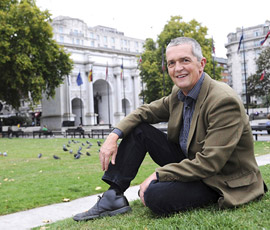OPINION: Politicians must show true colours on CAP

I’ve never been one for party politics. I guess I get it from Dad who, when he represented the village on the District Council, did so strictly as an Independent. More than once he was offered the easy votes that would have come his way if he accepted party patronage, but he always refused.
What’s more, he always won – thus beating the blues and reds into second and third place. The locals seemed to admire his determination to represent the village rather than take some party line. What also enamoured him to his electorate was the copious rounds of beer he liberally bought in the village pubs in the run up to the ballot, but that’s another story.
The sad fact is that the age of the independent politician is largely over once you get beyond the parish council. Nowadays there is no getting away from the four or five national political parties that dominate.
As farmers it’s tempting to give party politics a wide berth by concentrating on running the businesses back home as best as we can. If only life were that simple. Like it or not farmers are sucked into the political mire despite our best attempts to navigate around it.
On one side of us lies increasing regulation that drives up our costs; on the other side, lies the CAP and the three billion euros it rains down on English agriculture. Love them or loathe them, it is all too often the politicians and their parties who decide who gets what, when and how.
To my simple mind one of the frustrations of farming in England is the semi-detached approach our politicians have when it comes to their engagement with the CAP. It all seemed to start in the eighties when Mrs Thatcher could hardly contain her distaste for the EU and its market-interfering CAP.
Tory agriculture ministers went into negotiations with all the enthusiasm of a groom at a shotgun wedding. Similarly, In the 1990s their Labour successors seemed keen to overlook the fact that the A in CAP stood for agriculture. The farming industry was not part of their constituency and they let the farming lobby know it.
Today, under the Tory-led coalition the level of engagement seems little better. Indeed, DEFRA seems to be led by politicians who are keener to imagine English agriculture outside the CAP than they are determined to work out how they can get the best deal for English farmers within it.
As a distraction, we now have the emergence of UKIP who are turning some farming heads with their promises of a CAP equivalent outside the EU. Other farmers remain unconvinced that UKIP can deliver this best of both worlds.
But no matter what the hue of the party in power, somehow English farmers always seem to suffer CAP reform with more pain than their continental counterparts. The question that our lords and masters never seem to ask is, what effect will their decisions have on English farm output? Small wonder then that our farm output over the last 30 years has shrunk at a greater rate than the EU average.
With the prospect of an EU referendum on the horiizon, maybe now is the time to smoke out exactly where our politicians stand on the CAP.
If politicians advocate staying in the EU then it doesn’t seem too much to ask if they will put maximising English farm production at the top of their CAP agenda. If, on the other hand, they want to leave the EU then what exactly would they put in its place?
Guy Smith comes from a mixed family farm on the north-east Essex coast. The farm is officially recognised as the driest spot in the British Isles. Situated on the coast close to Clacton-on-sea, the business is well diversified with a golf course, shop, fishing lakes and airstrip
Share your views on this and other issues on our forums
